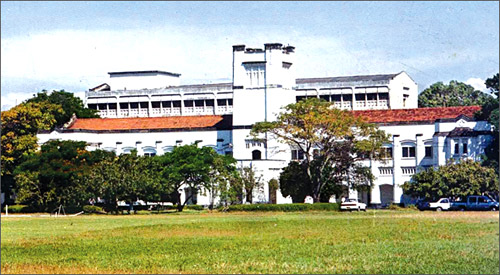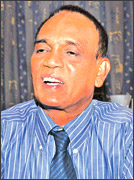New epoch for higher education - UGC Chairman
By L.S. Ananda WEDAARACHCHI
|

University of Colombo
|
Higher Education in Sri Lanka is moving towards a new era, said
University Grants Commission (UGC), Chairman Professor Gamini
Samaranayake.
There are fifteen universities, three campuses , one open university
with twenty four centres, sixteen undergraduate and post graduate
institutions, eight degree awarding institutions with a student
population of 80,000 in Sri Lanka at present.
Sunday Observer interviewed UGC Chairman.
Excerpts of the interview:
Q: What are the challenges for the university education?
A: Challenges are manifold. However, the key issue is how to
maintain the core values of university education such as autonomy within
the universities and academic freedom while keeping pace with
globalisation. This has to be done while finding solutions for
increasing access to and improving quality and equity of university
education, It is time to review the trajectory of education itself and
learn from our successes and failures so that we can charter our future.
|

Prof Gamini Samaranayake |
Q: The government was compelled to change the system of
university education to meet the increasing demand for higher education
due to the expansion of access to primary and secondary education, your
comments.
A: Education continues to be the only means of upward mobility
for the poor in eliminating gender disparities. However, our policy
makers have failed to address the anomalies that persist in access,
equity and quality of higher education mainly in old universities and
the newly set up ones. This problem was exacerbated by violence that
gripped the North and the East of Sri Lanka over the last three decades
resulting in restricting the number actually registered with those
universities.
Q: What is the consequences of this situation to the country?
A: The widening gap between the demand and supply in access,
equity and quality in higher education continues to breed a young
educated lot disenchanted social force in the country.
There is evidence to prove that there is a strong correlation between
the youth unemployment and the lack of access to higher education and
skills development.
The political manifestations of which are the on set of the social
and political unrest of youth erupted in the South and the North of Sri
Lanka.
Given this specific history, it should be emphasised that social
unrest of the youth and access to higher education and skills
development have been critical issues in the country which subsequent
governments had to address.
Q: There is an allegation that certain extremist political
forces such as the JVP exploited this situation. Your comments please?
|

University of Peradeniya |
A: Yes. The intervention of political parties to create
disturbances through indoctrination has created new forces to the
detriment of the peaceful environment in universities.
This has its impact on university education and policy and as such
the university authorities have to continuously address the casual
factors of these issues since such a fluid state exists due to these
politically destructive forces.
Q: The aim of university education is to meet the standard of
global knowledge. Are the university authorities in Sri Lanka aware of
this challenge?
A: Sri Lanka is well on its way to achieving the United
Nations Millennium Development Goals for education such as universal
enrolment in primary and secondary education. An advanced form of modern
education is what Sri Lanka is in need of at present.
Higher education has to keep pace with the changing world.
Globalisation includes broad economic, political and other trends,
Information Technology (IT) the use of English, the rise of the private
sector, the marketisation of higher education and related aspects that
are more or less inevitable results of a changing global environment.
Q: Sri Lanka wants to be the knowledge hub in Asia. Higher
Education Minister S.B. Dissanayake has said that Sri Lanka's higher
education sector wishes to admit large numbers of regional and European
students. What is the present position?
A: Sri Lanka has received a significant response from several
established universities that they were interested in setting up
offshore campuses.
This is being processed at the moment.
Q: Some universities in the West have been designated as world
class universities what does it mean?
A: The quality of higher education is measured based on
aspects such as modernized classrooms, libraries, laboratories, study
halls, syllabi and methods of teaching and evaluation.
Currently the foreign universities such as Oxford, Cambridge, College
of London, Imperial College of London, Yale, Harward staford and
Berkeley are recognised for research and education. They excel in the
advancement of human knowledge of nature and culture providing the best
scholarship training for the next generation.
Q: What is your opinion about the local universities,
colleges, and higher education institutions.
A: I believe we should explore all options and means of
expanding higher education while addressing the deficiencies in quality.
Poor quality is defined as the poor alignment of course content with the
country's development goals lack of availability of qualified and
trained human resources.
Academic and non-academic in providing quality higher education and
lack of effective and efficient management of resources and
infrastructure facilities.
To improve quality we need to diversify our courses, and reform
curricula develop corporate plans with strong human resource development
strategies, increase efficiency, and effectiveness through better
management of resources and introduce an element of performance based
funding as well as an academic and administrative audit.
Q: Can you explain what is a good university in the context of
the future university education in Sri Lanka?
A: A university is an educational institution where all
stakeholders work collectively and in harmony towards achieving the
vision and mission of higher education.
The success of a university is measured by the funds it raises,
recruitment of staff and students and the availability of freedom of
autonomy and leadership. The challenges ahead of policy-makers of
university education are not in meeting demands of the quantitative
change of university education, but in managing and focusing on
qualitative changes. |

